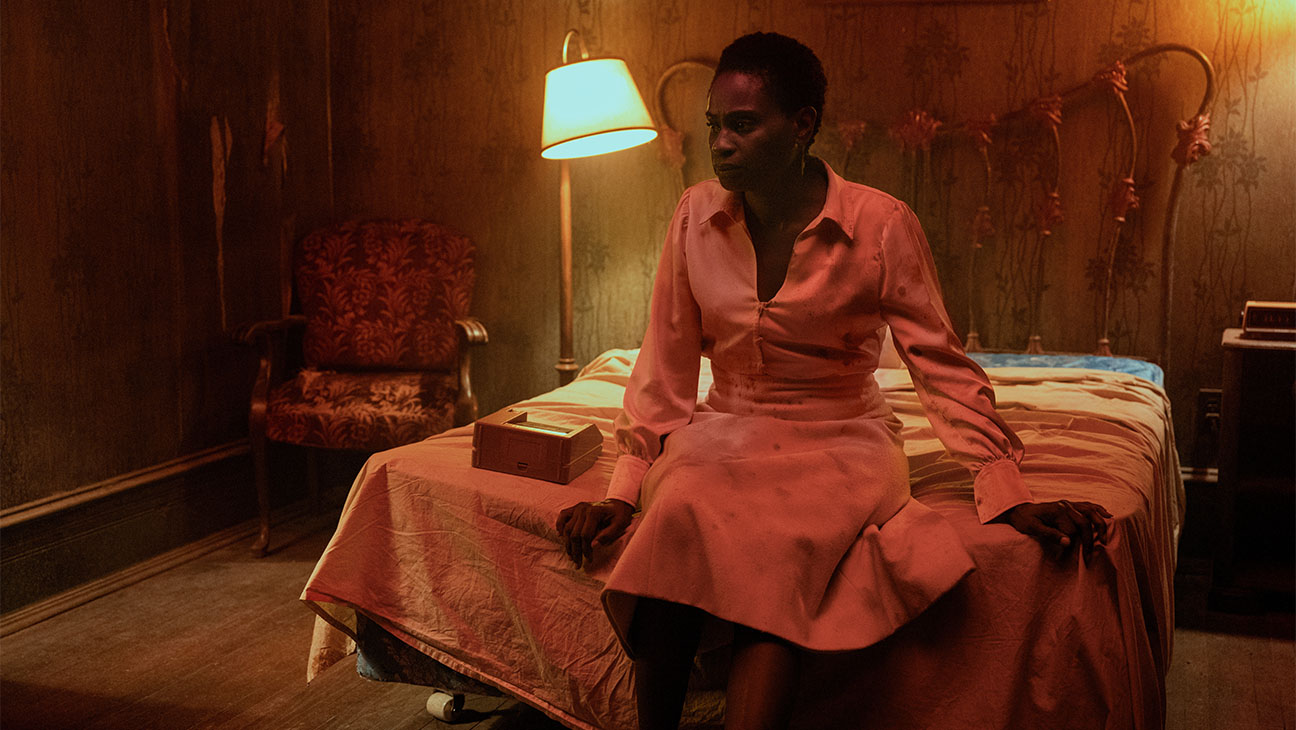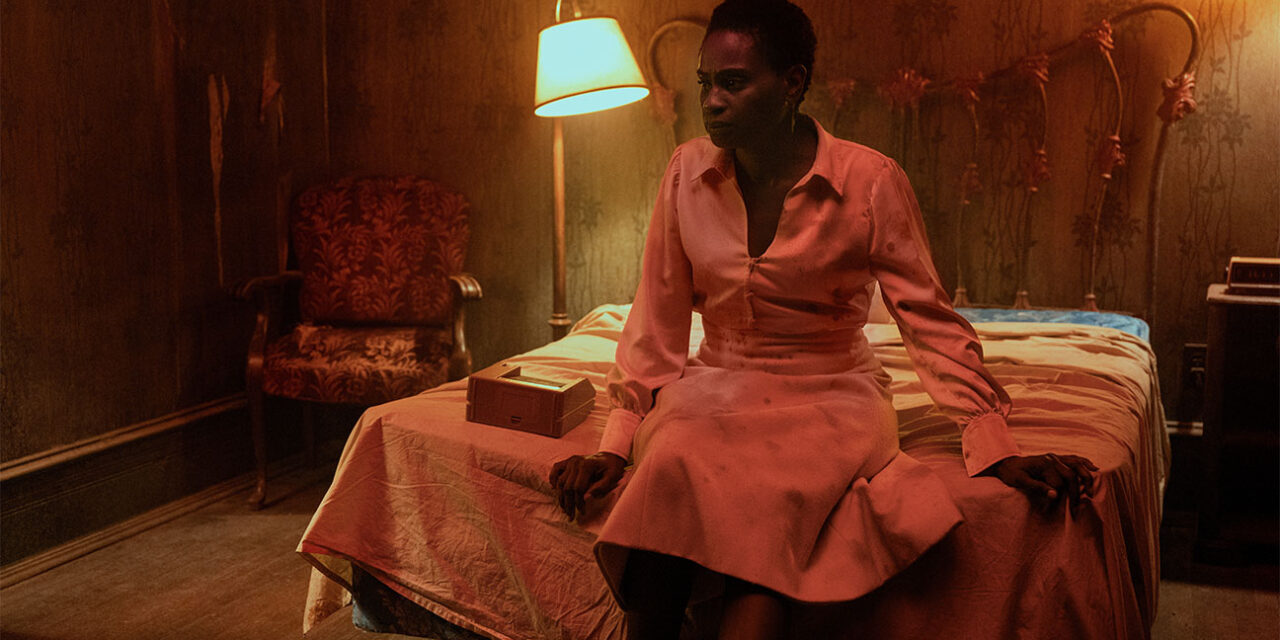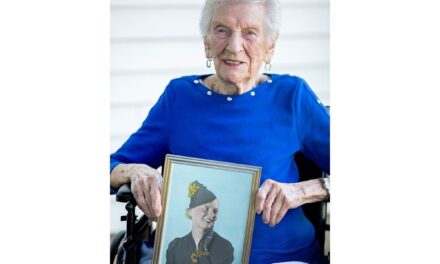[This story contains spoilers from episode seven of The Changeling.]
In “Stormy Weather,” the penultimate episode of The Changeling, all the flashbacks of Apollo’s (LaKeith Stanfield) childhood and the early days of his mother’s relationship with his father Brian (Jared Abrahamson) that have been sprinkled throughout the season bring viewers to the Elk Hotel in Times Square, a seedy location steeped in even darker memories. It’s there that Lillian Kagwa (Adina Porter) recounts the deal she made decades prior, which sets in motion the turmoil her son is now enduring as a father.
Through a series of monologues, a vocal performance and musings on faith, motherhood and identity that unfold like a secret stage play only select audiences have privy to, Lillian reveals the totality of the incident that forced her to emigrate from Uganda to the United States, and the chilling threats Brian nearly made good on one day that forced her to kill him and retreat to the very hotel room we see her in today, 35 years prior planning to kill herself. Up until that point, audiences, like Apollo, were under the impression that Brian had abandoned his son.
“It’s a foundational thing that has driven Apollo throughout his life,” explains Michael Francis Williams, director of episode seven. “It’s why we see him not be able to believe his wife or that things could be unfolding the way they are. He’s pushing against that and fighting for his son, because he’s determined to not be his father.
“In this episode we get to see the why, and we’ll see how that affects Apollo at a later time when he learns it,” adds Williams. “But right now, we’re showing the audience: This is why there’s this big hole in Apollo’s life. Something really heavy happened that rested on the shoulders of Lillian to manage as a mother to survive, and to keep her boy safe and let him have a future.”
As she relives that tumultuous moment from her past through her younger self, Lillian almost hauntingly states, “There is nothing we will not do for the ones we love.” Grappling with the reality that she is a Black female immigrant in America who murdered a white male cop, Lillian makes a bargain with a higher power to let her walk away from her crime unscathed. Yet the deal was not without cost as Lillian posits her son Apollo is now paying for her sins as he continues to search for his wife Emma (Clark Backo), whom he believes murdered their infant son.
The journey to that conclusion is far less straightforward on screen in the uniquely crafted standalone episode, which is one of the things that drew Williams to the Apple TV+ adaptation of Victor LaValle’s book.
“I very rarely see an episode of TV dedicated to an older Black woman in all her complexity and all her interior, emotional hopes and dreams, and strife and reckonings and rememberings and the complexity of that,” he tells The Hollywood Reporter in the Q&A below.
He also credits an unlikely source for helping him delve deeper into his creativity in determining how to visually represent Lillian’s life story.
“I shot the episode in Toronto the week that [Beyoncé’s] Renaissance came out and all I did driving to and from set, dealing with these giant themes of death and destruction, was listen to that album. It kind of helped me imagine,” says Williams, who adds he’s partial to track no. 9 “Virgo’s Groove.”
“The scope and scale and magic of that, and the different pockets she goes into, if my episode could be one Beyoncé track, it would be ‘Virgo’s Groove.’”
***
What interested you most in coming on board for this project?
I looked at the dream team of who was assembled to make this thing — the book by Victor, LaKeith being attached, Clark Backo, Melina Matsoukas directing the pilot — it’s phenomenal, plus getting to work with Kelly Marcel as a showrunner, and Adina in my episode. It’s such a rare thing to read a show like this. In the landscape of TV, there’s not many premium Black dramas that deal with the full range of who we are in a very human way, and at this kind of elevated level that pulls in magic realism and horror and mythology and all these things. It’s a super unique show, and I would beg, borrow and steal to be on it.
What were those initial conversations with Kelly Marcel like when it came to making this standalone episode?
I know that in adapting the novel from Victor’s book, she was really keen to expand the female perspective on these really big human struggles, and strains and traumas that our characters go through. She wanted to expand Apollo’s mother Lillian’s story, and I’m really grateful that she did that. Coming to it as a director, you look at a lot of different things.
Talking to my lead in the show, Adina, we were both in rehearsal going, “This is such a rare piece of work on such a premium platform.” It was a gift to get to helm that. It was a dream to collaborate with some really brave artists on this show, who always said, “Yes, and?” It was always about plussing what we can do. Even on set with Kelly, she would probe, and I’d be like, “Hey, can we execute a scene this way? What if we did that, and move that wall, change that, break some of the conventions of television, and create something fresh for an audience to experience?”
She was always a positive collaborator in that, helping me elevate what we could do and what we could feel to put you in Lillian’s shoes. All the aesthetic choices in my episode are there to immerse the audience in her subjective emotional place in the world. They’re not style for style’s sake. They’re there to put you shoulder to shoulder with her as she examines these parts of her life that have led her to this one dark night of the soul.
How much time did have to bring this episode to life from a production standpoint?
TV production is a runaway train. For a single episode, eight days is a pretty standard thing. And then within that, I’m trying to pull off opera and Broadway, and deep psychological drama and so many things. I was in a meeting with our producer David Knoller, I think it was a table read, and he scribbled on his script, “The bottle episode has become a magnum,” and I was like, “Yes.” So, I have to shout out our producers and Apple TV+. They always supported that vision to elevate, to push, to expand. I also have to shout out my actors because these kinds of long monologues are really hard to land, and the way that Adina owned and embodied and channeled herself into this character was just incredible to watch and witness. I’m there to protect that, shape it and lift it up and present it to an audience.
One of the scenes that oddly provides relief from the heaviness of the episode is when Lillian sings “Stormy Weather” to the young man who’s dying in the hotel. Can you talk about what that scene is conveying, and choosing its specific timing in the middle of the episode?
There’s a line in the show, “We cast our dreams as a play,” and a device that Kelly decided on was that multiple actors would play multiple roles within the season, and that kind of comes to a head in this episode. The moment is ’80s New York, Times Square, a small flea-bitten motel — a very specific time and a place — and part of that choice is to ground the audience. There were some real-life things unfolding at the time, such as the AIDS epidemic. So that moment was based on patient zero at the start of this epidemic, but it’s also Lillian re-imagining her own storyline onto this moment in history. We get to relive her own struggles with the father of her child and how things kind of spiraled in on her, and she had to make a choice that any mother would. There are big, weighty themes and my job as a director is to navigate that in a sympathetic way, but also to transport an audience into the emotional feeling of what Lillian’s going through. So, we go into “Stormy Weather” and we’re on a Broadway stage, and then there’s the sensitivity of someone passing away and someone re-finding themselves.

Adina Porter in The Changeling.
It’s a high-wire act and we only had a few hours of one evening to pull off that whole sequence. It’s really challenging stuff as a director, but really thrilling. I kind of love getting scared like that. I’m always asking my actors to jump off the cliff. I’m always asking my actors to stand out there and feel the fear and do it anyway. And I, myself, as an artist and a director, always want to feel like I’m making work that also takes that same leap because I want to make an audience feel something. I’m always going to use lots of different skills to do that. That’s my job to try and immerse you, to pull you out of the scene and put you into our stages.
To that point, there’s an inscription from the book that appears at the end of the episode detailing the Great Garbage Strike of 1968. Was the decision to include that also a part of grounding this fairytale?
Yeah, this series as a whole is a really faithful adaptation of Victor’s book. Novels have a super complex nuanced weaving of layers and legacies and all sorts of things that work on the page and transposing that onto a screen is difficult. TV’s a different beast. But we made the choice to be really faithful to Victor’s work, so things like that, for me, are helpful anchors to the audience. The boy she encounters in that room, the choice of that song, the memories that people have, the garbage strike, these are all things that anchor us to a time and a place. They remind the audience where we are in the world, because we’re doing these giant flights of fantasy where ceilings disappear, and walls slide back, and stages burst open. I don’t want to lose an audience in giving these moments.
In a couple of her monologues, Lillian speaks to this idea of Americanness, saying at the end of her ordeal with Apollo’s father, “I finally feel like an American.” What do you think she means when she says that?
It’s a tricky one, isn’t it? It’s an immigrant story and one I relate to. I live in L.A., I’m from London, I’ve been here for seven or eight years, so I was really interested in Lillian’s point of view on this dream of America; what you leave behind, what you encounter here. The reality of it, in surviving or thriving or learning, is complicated. It’s a pointed line at the end of the episode, and I’m sure Kelly or Victor could better answer this specifically, but I liked how her character wrestles with her identity. To leave a place like Uganda and land in Times Square is like landing on Mars. It’s like time travel. So, her wrestling with, “Who am I in this moment? I know what I survived, I know what I’ve created, and I know what I hope for, and I know where I come from”— all those things she looks at in this episode and walks away with, I think in the remembering there’s kind of a forgiveness of herself. She manages to leave the guilt of that turmoil on the shoulders of the man who caused the worst part of it. And she’s able to walk out into the street and make it less about her own interiority that the episode has and stand in Times Square and go, I’m part of this. I’m part of something bigger. I’m not just the things that traumatize and plague me inside. Here I am in this world, and here I can step forward and build.
Amid many of the early critiques of this series, episode seven was generally well-received by reviewers. Why do you think that is?
I think it does something really bold and challenging and new for TV. The landscape is broad in this kind of moment, the second golden age of TV. For premium Black dramas, of which there are very few, this is a unique show and a unique episode. I think it works because of the series. It works because of what Melina set up in the pilot, the tonal choices, the rules choices, the cinema language that she chose which Jonathan Van Tulleken carried throughout the series and that Slick Naim worked on in the finale so that when I come in at the penultimate episode, I’m able to subvert some of these rules, break some of these walls, because we’re trying to break into her mind and examine this unraveling. I can only do that if the rest of the series has done an incredible job at setting up something solid that I can then interrogate. It doesn’t exist in isolation. Kelly really let me go off.
Interview edited for length and clarity.
The finale of The Changeling releases on Friday.





